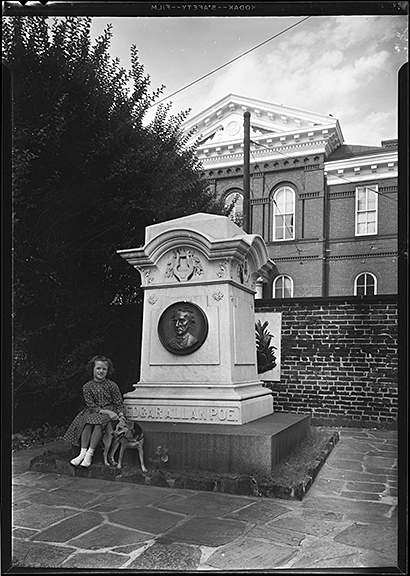(Maryland Historical Society, 10/22/2015)
The mysterious death of writer Edgar Allan Poe still haunts and fascinates his fans and biographers. The facts of his untimely passing in 1849 have been obscured and confused since he was found barely conscious in a Baltimore tavern. Even the events and location of Poe’s burial have been shrouded in enigma.
On September 27, 1849, Poe left Richmond, Virginia for New York via Baltimore and Philadelphia. He was slated to edit the work of fellow poet, Marguerite St. Leon Loud, while in Philadelphia. After he completed this work, he would travel to New York to pick up his aunt and former mother-in-law, Maria Clemm, and bring her back to Richmond to attend Poe’s wedding to Elmira Shelton. Poe never made it to New York. He was instead waylaid in Baltimore, where he met his end.

A slightly ghoulish image. A girl and her dog with Poe’s remains. Poe’s Memorial Grave, October 21, 1956, A. Audrey Bodine, B209-4, Baltimore City Life Museum Collection, Maryland Historical Society.
The events of the days following his departure remain tantalizingly elusive. On his way to the train to Philadelphia in Baltimore, it appears he ran into some old friends and was convinced to have a drink with them, even though he had recently joined the Sons of Temperance. That was the last anyone heard of Poe until he was found on October 3 at Gunner’s Hall, a Fourth Ward polling place, located at what is now the 900 block of East Lombard Street, in a state of stupor and disarray. Poe’s friend Joseph Evan Snodgrass and his uncle Henry Herring were summoned to fetch the near comatose bard. Snodgrass was completely shocked at the condition of his friend, later recalling, “…I instantly recognized the face of one whom I had often seen and knew well, although it wore an aspect of vacant stupidity which made me shudder. The intellectual flash of his eye had vanished….”(1) He also noted that the clothing Poe wore could not possibly be his own. Not only were they filthy, but they were cheaply made and ill fitting, which was very uncharacteristic for a man known for his smart dressing. He was taken to Washington College Hospital (later the Church Home and Hospital), where he died four days later. His illness was marked by fits of delirium and nonsensical ramblings. He repeatedly called out the name “Reynolds.” “Lord, help my poor Soul,” were his last words before he expired on October 7th.
Theories abound as to what caused his death: an alcohol or drug overdose, untreated diabetes, rabies, and even murder. The official cause of death at the time was “congestion of the brain.”
Continue reading at
Maryland Historical Society’s “Underbelly” Blog.
